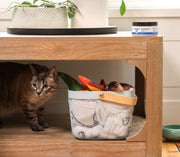Having two cats means twice the purrs, double the playing and a whole lot more love, but having more than one pet also means more care. For many people, maintaining the litter box is one of the biggest hassles of being cat parents. The thought of having to deal with multiple litter boxes can leave you wondering, “Can two cats share a litter box?” After all, if your cats share, you won’t have to worry about cleaning more than one.
It turns out the answer isn’t so straightforward, so we put together this post to help explore the question, “Can cats share the same litter box?”
Drawbacks to Cats Sharing Litter Boxes
So do cats share litter boxes? The answer is maybe. In some cases, you may be able to have more than one cat use the same box.
Compared to, “Can cats share litter boxes?” WILL cats share a litter box may be the better question. You can have just one litter box per cat, but issues can arise if you make this decision. Some potential problems of having two cats share include:
- Territorial behavior: Two cats can live peacefully in the same home, but your kitties may want spaces that are just their own. Cats may refuse a shared litter box, and if this happens, you could end up finding urine or feces in other parts of your home.
- Aggression: In many cases, one cat can become dominant over another cat. If this occurs, the alpha kitty may bully the other cat away from the litter box through aggressive behavior like growling, hissing, scratching and biting. This can leave the other cat unable to enter the box, increasing the likelihood of finding messes in other areas.
- Differing preferences and needs: One of the biggest reasons why the answer to the question, “Can 2 cats share a litter box?” is often no, is because cats are notoriously picky. If they don’t like the consistency or smell of the litter , they may refuse to use it, and one cat may prefer a type of litter that the other hates.
Advantages of Having Two Litter Boxes
Although the answer to the question, “Can two cats use the same litter box?” is sometimes yes, there are some distinct advantages to having two litter boxes for your pets. These include:
- Less stress: Having two litter boxes eliminates the risk of the issues described above occurring. Each cat can have their own private place to go to the bathroom, and you won’t have to worry about aggression. Plus, you can use the type of litter each cat prefers. Overall, multiple boxes can reduce stress for you and your pets.
- Reduced odors: With multiple boxes, you can keep litter in different parts of your home. Doing so can cut down on cat odors to keep your home smelling fresher.
- Easier cleaning: When multiple cats share a litter box, waste will build up more quickly. You may find yourself having to clean and change the litter in a multi-cat box more often than you do individual boxes.
Factors to Consider When Sharing Litter Boxes
If you do choose to have cats share litter boxes, consider the following:
- How many cats do you have? The more cats that will be sharing a box, the larger the box will need to be to accommodate them. Otherwise, the box will get dirty quickly, and your cats may be unwilling to use it.
- How old are your cats? An older cat may be more likely to keep a kitten or young cat out of the litter box. You’ll need to keep a close eye on your cats for signs of aggression. Senior cats that are set in their ways may also have difficulty adjusting to a new cat using their litter. If you’re introducing a new pet to your home, separate litter boxes may be a better solution.
- Do your cats have any medical problems? Idiopathic cystitis is a common medical condition in cats that can lead to problems urinating. For some cats, stress makes flare-ups of the condition more likely to occur. If you have a kitty with the condition or any other health concern, talk to your veterinarian before trying to have your cats share litter boxes.
How to Address Litter Box Odor in a Multi-Cat Home
Whether you decide to have your cats share or use separate litter boxes, here are some things you can do to cut down on cat and litter box odors in your multi-kitty home. Follow these tips to keep your home smelling great.
Clean the Litter Daily
Scoop out waste at least once a day. Put it in a bag that you can tie closed or seal and then throw it away in a trash can with a lid.
Change the Litter Regularly
Every two to four weeks, dump out all the litter and emptyrefill the box with fresh, clean litter. Place the litter in a bag that you can tie shut or seal and toss it in a garbage can with a lid.
Only Use Kitty Litter
Sand and other litter alternatives typically don’t provide odor-fighting benefits. Alternatives that don’t form clumps can also make it more difficult to clean the box properly, making odors more likely to occur.
Position Boxes Strategically
Try to put litter boxes in rooms where you don’t spend a lot of time, such as mudrooms, laundry rooms and basements. Keeping the litter box in a bedroom, living room, kitchen or bathroom can make dealing with odors more difficult. Plus, there’s a greater risk of the litter getting bumped or spilled in high-traffic areas.
Freshen Things Up with Fresh Wave
Fresh Wave Odor Removing Lemongrass Litter Box Gel is specially formulated to absorb unpleasant litter box odors. Place it within 3 feet of the litter box, and you’ll notice a reduction in odors within 15 to 30 days. The formula features only natural plant oils and is free of toxic ingredients, making it safe for your cats and the rest of your family. Order a jar today and start fighting litter box odors with the power of plant-based ingredients.



